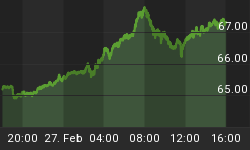Today's larger than expected .6% increase in January Ex-Autos retail sales, while heralded as good news by Wall Street economists, is actually bad news for the long-term health of the U.S. economy. In the past twelve months over-all retail sales rose 7.2%, while the ex-auto gain was 7.6%. By far the category registering the largest percentage increase was gasoline, up 17.3%, followed by building material, hardware and garden supplies, up 14.1%. The latter category, which has seen significant price pressure lately, includes purchases which were no doubt financed by home equity loans that will only become increasingly more costly, and a bigger drain on future retail sales, as interest rates rise.
In addition, much of the increase in retail sales resulted from greater purchases of imported products. Had strong retails sales resulted from Americans paying cash to purchase greater quantities of increased domestic production, last year's sales figures would indeed have been reflective of economic strength. However, since the increase resulted from higher prices, rising imports and credit creation, increasing retail sales merely reflect inflation.
Further, as the bear-market rally in stocks appears to have ended, and with the housing bubble closer to bursting, reduced household "wealth" is likely to undermine future retail sales. In addition, rising interest rates will divert an increasing percentage of household income to debt service, reducing the share available for discretionary spending that goes in large part toward retail sales. Similarly, as highly indebted consumers look to pay down debt and replenish their non-existing savings, future retail sales will suffer. Most importantly, increasing retail sales have produced larger trade deficits and a weaker dollar, which intern will lead to rising import prices and higher future interest payments to foreign creditors.
Although some analysts consider consumer spending to be the best measure of economic health, retail sales actually measure the consumption of wealth rather than its creation. In reality, no celebration should be sparked by the fact that over-indebted Americans indulged themselves further by purchasing more imported products on credit. Nor should we rejoice because inflation results in increased sales though higher prices. By going deeper into debt to consume today, Americans will be forced to reduce consumption by even greater amounts tomorrow to allow for the repayment of principal plus interest. Thus future retail sales will suffer as a direct result of their own artificially enhanced past strength.
The only true way for the real value of future retail sales to grow is for Americans to save more. Higher personal savings results in interest income, which enables greater future consumption. However, such a responsible and beneficial change in consumer behavior is being resisted by the Fed, which is doing everything in its power to encourage Americans to go even deeper into debt. A decline in current retail sales, which would result from more responsible consumer behavior, would likely push the U.S. economy into recession. The Fed, in an effort to postpone that recession, is only ensuring that the ultimate recession will be that much more severe.
What so many modern economists fail to understand is that the only true way that a society can increase consumption is to first increase production, which must be proceeded by capital accumulation, which, in turn, must be financed though savings. The 19th Century French economist Jean-Bapsiste Say, expressed this concept well "Encouragement of consumption is no benefit to commerce, for the difficulty lies in supplying the means, not in stimulating the desire of consumption; and we have seen that production alone furnishes those means. Thus, it is the aim of good government to stimulate production, of bad government to encourage consumption." Can there be any doubt as to into which category our current government falls?















